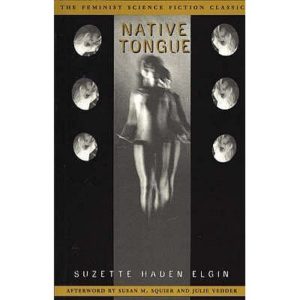 A new TV series dramatizes Margaret Atwood’s 1985 novel, “The Handmaid’s Tale,” about a dystopian future society where women are once again the chattel of men and farmed as breeders. Not as many people have heard about “Native Tongue,” a novel with an almost identical theme that came out the year before Atwood’s. I read Elgin’s “Native Tongue” because the women surreptitiously spend their time developing a special language that only they can understand and I thought a linguistics theme would be more interesting than Atwood’s heavy-handed theocratic theme.
A new TV series dramatizes Margaret Atwood’s 1985 novel, “The Handmaid’s Tale,” about a dystopian future society where women are once again the chattel of men and farmed as breeders. Not as many people have heard about “Native Tongue,” a novel with an almost identical theme that came out the year before Atwood’s. I read Elgin’s “Native Tongue” because the women surreptitiously spend their time developing a special language that only they can understand and I thought a linguistics theme would be more interesting than Atwood’s heavy-handed theocratic theme.
The two novels are eerily similar. Native Tongue is a foundational feminist novel but never did win the Pulitzer and all the many other prizes that Atwood’s did. Atwood wrote “A Handmaid’s Tale” in 1984. Some scholars somewhere must have tracked down the relationship between these two authors. I don’t remember what was going on in the mid-80’s with women. Something odd must have been the water.
According to Wittgenstein (not explicitly mentioned in Native Tongue), it is impossible to make up a language. Languages emerge organically from the ways of living in a community. All you can do is translate an existing natural language into another one. The men in the story believe this so they ignore the women’s silly language games. But the women do succeed. There are interesting bits of linguistic theory like that driving the story line and that’s why I enjoyed it.
The special women’s language contains words that describe phenomena only women notice, things that are too subtle for the coarse, thick-headed men. An example is “dooledosh,” a word that means pain coming as a relief after one has feared it for a long time A mock dictionary of terms from the women’s language in the back of the book defines other words.
Throughout, the men are arrogant, egocentric bullies, dismissive of women, who are tolerated only as property. Women are obviously oppressed victims, though cunning. This cartoony setup can lead to some fun dialog but it gets old fast and limits character development, of which there is virtually none in the book.
Despite the feminist ideas, I categorize this novel as mostly sci-fi, stretching the bounds of language and society, but without illuminating much new about human psychology. The ‘battle of the sexes” is old news. However, any feminist novel makes the case that ‘women are people too,’ and enough psi-fi elements shine through in this one to put it on my psi-fi list.
Elgin, Suzette Haden (1984). Native Tongue. New York: The Feminist Press (304 pp).